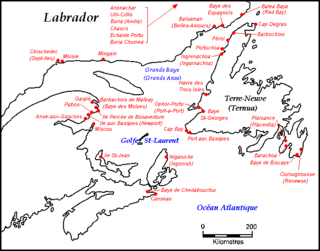Algonquian–Basque pidgin
Appearance
You can help expand this article with text translated from the corresponding article in Basque. (July 2014) Click [show] for important translation instructions.
|
| Algonquian–Basque pidgin | |
|---|---|
| Souriquois | |
| Region | Gulf of St. Lawrence |
| Ethnicity | Basques, local Algonquian peoples |
| Era | 16th to 18th century[1] |
Basque-based pidgin | |
| Language codes | |
| ISO 639-3 | None (mis) |
qba | |
| Glottolog | basq1252 |
 Basque and Breton fishing sites in 16th and 17th centuries. | |
Algonquian–Basque pidgin, also known as Souriquois,[2] is a Basque-based pidgin proposed by linguist Peter Bakker to have been spoken by Basque whalers and various Algonquian peoples.[1] It was spoken around the Gulf of Saint Lawrence. It was in use from at least 1580 until 1635,[2] and was last attested in 1711.[1][page needed]
There were three groups of First Nations that the Basque people distinguished. The ones with which they had good relations were the Montagnais and the St. Lawrence Iroquoians. They also knew of the Inuit, whom they considered hostile. The Basque people referred to them as the Montaneses, the Canaleses, and the Esquimoas, respectively.[3]
Vocabulary
[edit]| Pidgin | Original language | English translation |
|---|---|---|
| Normandia | Normandia (Basque), 'Normandy' | French |
| kir | kir (Mi'kmaq) | you |
| ania | anaia (Basque) | brother |
| capitana | capitaina (Basque), kapitaina in Standard Basque | captain |
| endia | andia (Basque), handia in Standard Basque | large |
| chave | chave (Romance) | know |
| ouias | wiya:s (Innu-aimun) | meat |
| amiscou | amisku (Innu-aimun) | beaver |
See also
[edit]References
[edit]- ^ a b c Bakker, Peter (Fall–Winter 1989). ""The Language of the Coast Tribes is Half Basque": A Basque-American Indian Pidgin in Use between Europeans and Native Americans in North America, ca. 1540-ca. 1640". Anthropological Linguistics. 31 (3/4). Trustees of Indiana University: 117–147. JSTOR 30027995.
- ^ a b c Mithun, Marianne (7 June 2001). The Languages of Native North America. Cambridge University Press. p. VII. ISBN 9781107392809.
- ^ "Echoes from the Past". Archived from the original on 2012-09-29. Retrieved 2012-07-06.
- ^ Gray, Edward (2000). The Language Encounter in the Americas, 1492-1800. Berghahn Books. pp. 342. ISBN 9781571812100.
The Language Encounter in the Americas, 1492-1800: A Collection of Essays.
Further reading
[edit]- Koldo Mitxelena (1984): "Lingüística inmanente y lingüística trascendente", "Julio Urquijo" Euskal Filologiaren Seminoarioaren Urtekaria, 18, 251–266. orr, Donostia, Gipuzkoako Foru Aldundia.
Categories:
- Algonquian languages
- Basque-based pidgins and creoles
- Basque diaspora in North America
- Extinct languages of North America
- North America Native-based pidgins and creoles
- Languages attested from the 16th century
- 16th-century establishments in North America
- Languages extinct in the 18th century
- 18th-century disestablishments in North America
